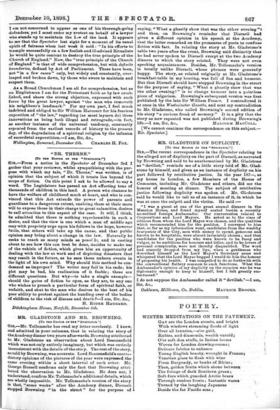MR. GLADSTONE AND MR. BROWNING.
(To THE ED110111 OF THE " SPECTATOB.'
EIR,—Mr. Tollemache has read my letter carelessly. I knew, and admitted in your columns, that in relating the story of the Academy dinner two years afterwards, Browning attributed to Mr. Gladstone an observation about Lord Beaconsfield which was not only entirely imaginary, but which was entirely inconsistent with the details of the story. The rest of the story, as told by Browning, was accurate. Lord Beaconsfield's contra- dictory opinions of the pictures of the year were expressed the same .evening within a short interval of each other. Mr. George Russell confirms only the fact that Browning attri- buted the observation to Mr. Gladstone. He does not, I understand, confirm Mr. Tollemache's additional details, which are wholly impossible. Mr. Tollemaehe's version of the story is that, "some weeks" after the Academy dinner, Disraeli stopped Browning " in the street " for the purpose of saying, What a ghastly show that was the other evening and then, on Browning's reminder that Disraeli had given a different opinion in his speech at the Academy, that the latter remarked on the proneness of poets to confuse fiction with fact. In relating the story at Mr. Gladstone's table two years after the event, Browning said distinctly that he had never spoken to Disraeli except at the two Academy dinners to which the story related. They were not even speaking acquaintances. Besides, Mr. Tollemache's version is totally unlike Disraeli, whose phrases were generally happy. The story, as related originally at Mr. Gladstone's breakfast-table in my hearing, was full of fun and humour. But that Disraeli should have stopped Browning in the street for the purpose of saying, "What a ghastly show that was the other evening! " is to change humour into a pointless piece of vulgarism. Browning's subsequent version was first published by the late Sir William Fraser. I contradicted it at once in the Westminster Gazette, and sent my contradiction to Mr. Gladstone, who called Browning's second edition of his story "a curious freak of memory." It is a pity that the story as now repeated was not published during Browning's life.—I am, Sir, Sec., MALCOLM MACCOLL. [We cannot continue the correspondence on this subject.-- ED. Spectator.]










































 Previous page
Previous page